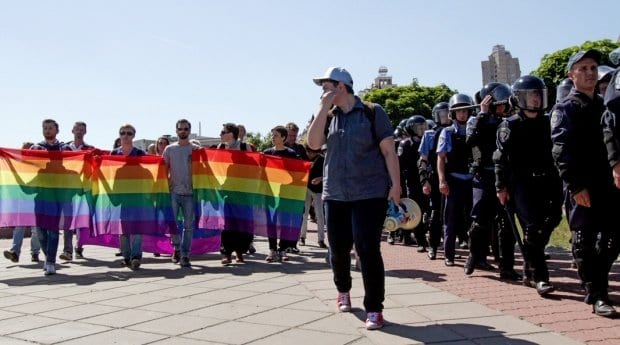There were no floats or drag queens at this year’s Pride march in Kiev, the capital of Ukraine.
Instead, Montreal Pride organizers Éric Pineault and Jean-Sébastien Boudreault were given a list of what not to do during their time in Kiev:
Don’t wear bright colours.
Don’t kiss.
Don’t hold hands.
Don’t talk to the police unless spoken to.
“We don’t live that everyday,” Boudreault says.
The June 6 march ended with nine injured police officers and 30 arrested people described by one local politician as “hooligans.” Far from the flamboyant Montreal celebration they are used to, the Canadian delegates say they’d never seen anything this bad.
The day started with a disorienting trip across Kiev to a location that was supposed to be kept secret until the day of the march. Pineault and Boudreault, along with some German Pride organizers, met with people from Amnesty International, who led them to the spot. After riding the high-speed metro for what felt like forever, Pineault and Boudreault were herded through apartment blocks to the starting location by the river. They had to cross three lines of police to get to the meeting point.
“We’re not used to that,” Boudreault says.
Every year, the president and vice-president of Montreal Pride go to a part of the world still struggling with LGBT equality. They’ve been to Riga, Warsaw and Cameroon, and had planned to go to Belgrade in 2014 but were forced to cancel due to floods.
“When we went to Riga years ago, the situation was the same,” Pineault notes. This year, the Baltic city held EuroPride, a pan-European event hosted by a different city each year.
In Kiev, the march didn’t get very far this year. Anti-gay radicals outside the police lines outnumbered the approximately 300 people who gathered to march. It wasn’t long before smoke bombs and small bombs were thrown, sending little bits of metal in all directions. One policeman was carried away by his colleagues, bleeding from a shrapnel cut to an artery in his neck.
Another man was carried away by police officers: a radical, shouting things in a language the Montreal delegates couldn’t understand. His face was contorted in rage, “demonic-looking,” Boudreault says. “How can you be so mad and so hateful towards someone who didn’t do anything to [you], whom you’ve never met?”
The precautions — like a secret location — clearly weren’t effective, they said. Someone must have leaked the information.
Kiev Pride organizers had tried to arrange for buses to and from the march for all participants, but the bus company reportedly told them, “We’ll take the diplomats, we’ll take the journalists, but we’re not taking any faggots.”
The attempt at securing transportation wasn’t for luxury’s sake. As soon as the walk ended, marchers were on their own with no police protection. They were told to pack up their flags and signs, look as inconspicuous as possible and even change into different clothes if they had any. Many of them were assaulted, Pineault says.
When he and his colleague completed the march and left the safety offered by police, they ran onto a road and found a taxi. They were accompanied by an LGBT leader from Munich who, according to the Montreal organizers, was shaking and asking the larger men for protection. From the cab they saw hooded figures running toward other marchers. Another group ran to catch a bus, but weren’t allowed on board and were forced to wait for the next bus. Other German LGBT organizers hid in the country’s nearby embassy for hours.
In a surprising twist the day before the event, Ukrainian president Petro Poroshenko gave his support for the march, calling it constitutional and thereby securing any necessary police protection. Kiev mayor Vitali Klitschko had earlier asked Pride organizers to call the event off, saying it was too dangerous.
Ukraine is caught politically and socially between its neighbours — Europe, with its emphasis on human rights and political and economic union, and Russia, where LGBT Muscovites were arrested a week earlier for trying to march. Conflicts in eastern Ukraine between pro-Russian separatists and Ukrainian forces are ongoing.
When people question the legitimacy of Pride, calling it nothing more than a big party, Pineault and Boudreault recall their experiences in other countries. “Yeah, it’s a big party,” Boudreault says “but not so long ago it wasn’t in Canada.”
In Quebec, there is still a lot of work to be done for trans rights, social acceptance in sports, and awareness in smaller towns, he notes. Although Kiev and the small towns in Canada are nowhere near each other, they remain starkly similar in their need for expanded LGBT rights.
“If you’re still not sure why we’re doing all this, go live a Pride in that environment,” he says.

 Why you can trust Xtra
Why you can trust Xtra


